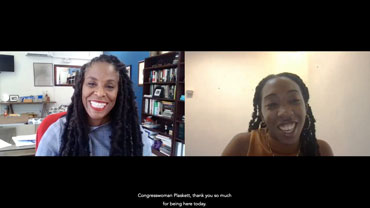
Above: Stacey Plaskett (SFS'88), left, delegate to the U.S. House of Representatives from the U.S. Virgin Islands, interviewed by Mariah Johnson (C'21, L'24)
The “We Are Georgetown: Celebrating Our Black History” oral history collection launched recently in DigitalGeorgetown with oral histories from 29 Black Georgetown students, staff, faculty, and alumni.
The Georgetown University African-American Advisory Board (GUAAAB) has led the effort to collect stories that document the history of Black members of the Georgetown community. “It allows us to elevate and amplify the diversity within the community,” said GUAAAB Chair Mannone Butler (B’94, L’99). “We aren’t monolithic, and these stories allow folks to see themselves” by seeing experiences they may have shared.
“These are powerful stories of resilience,” added Mike Ford (L’84), who co-chaired the project with Fonda Sutton (SFS ‘87, L’95, G’15). “Some participants had wonderful experiences at Georgetown and some not, but hopefully it has been healing for those who didn’t.”
GUAAAB started work on the collection in 2019. “It was rooted in the desire and recognition for the need to tell our stories and bring life, not just in written form, to the stories we have,” Butler said. “It allows us to provide a first-hand window into our stories and the makeup of our community.” The launch of the collection coincides with the launch of the Black Alumni Council (BAC), the first-ever affinity group within the Georgetown University Alumni Association (GUAA). Julia Farr (C’88), executive director of GUAA, and Yasmeen Mayes, Associate Director of Alumni Affinity Programs and Engagement, have been partners for the launch of the BAC, including this oral history project.
“Sharing the vibrant history of the Black members of the Georgetown community, through the voices of those who experienced it, gives an even greater moment to the launch of the Black Alumni Council,” Farr said. “The BAC offers a welcoming, inclusive home for all Black Hoyas to be a part of and to share their stories, too. I’m grateful to the GUAAAB under the leadership of Mannone Butler, with special thanks to Mike Ford and Fonda Sutton, for their inspired efforts in creating We are Georgetown, celebrating the people and the stories that are woven into the very fabric of who we are as a university.”
The project committee identified interview subjects who represent the Georgetown community, who have contributed to the culture of Georgetown, and those who have significant personal and professional accomplishments. Student and alumni volunteers conducted the interviews. Some of the oral histories collected so far include Stacey Plaskett (SFS’88), delegate to the U.S. House of Representatives from the U.S. Virgin Islands; entrepreneur Stephen Baldi (B’98); recent graduate Briana Thomas (C'21); Dean for Medical Education at Georgetown’s School of Medicine Lee Jones MD, Georgetown Vice President of Diversity, Equity, and Inclusion Rosemary Kilkenny (L’87), and Georgetown Board of Directors member Tyree P. Jones, Jr. (L’86).
Library Partnership
The oral histories are hosted in DigitalGeorgetown, the Library’s digital collections platform and institutional repository. “What struck me about the ability to partner with the Library from the outset was that there was an instant embracing of the project,” Butler said. “The Library recognized and embraced the importance of the project and the value of archiving these stories."
“From the outset, we partnered with the Booth Family Center for Special Collections, including Keith Gorman, Lynn Conway, and Ann Galloway, as we scoped the project,” Sutton noted. “Our library partners worked with us to iterate on potential formats and have collaborated closely with us to ensure the success of the project. Our library colleagues made it clear that our recordings of the Black experience at Georgetown represent a significant aspect of the university’s history which they were anxious to develop.”
Ford added, “We worked closely with [Digital Scholarship Services Unit Head] Megan Martinsen, who helped explain DigitalGeorgetown and the look and feel of it.” Other Digital Scholarship and Technology Services staff and the library’s archivists provided additional guidance in developing best practices for the collection.
Martinsen said, “The Library is passionate about collecting, documenting, and publishing the unique stories of our community members, and preserving them for future generations. We're excited that we could contribute our expertise to this wonderful project.”
Future of the Collection
The “We Are Georgetown” collection will continue to grow. Additional interviews are underway, including one from Georgetown President John J. DeGioia. Some participants have also shared memorabilia that may be donated to the University Archives. “We’re continuing to learn,” Ford said. “Our community is large, broad, rich, and diverse, and there are many stories to be told.”
“It has been really important to us to collect the stories intergenerationally, where we could, bringing current students and recent graduates together with older alumni and university administrators to share their experiences—spanning across the University’s undergraduate, graduate, and professional schools,” Sutton added.
While the collection launched with a focus on a relatively recent period—the 1960s to today—the team’s long term plan is to document the Black experience at Georgetown from the school’s inception. “I think that our presence on campus has not always been celebrated throughout our history,” Ford noted. “It was our community that saved Georgetown. To talk about that history requires a celebration of our strength, from persistence to perseverance, from possibility to prominence.”
Sutton suggested that “We Are Georgetown” can also serve as a model for documenting other historical content for education and research purposes. “There are other affinity groups, significant moments of student-led change, histories and folklore about physical spaces across our campuses,” she said. “The opportunities to capture more of those stories are limitless.”
“While this project started with the Black community, our hope is that the broader university community will see this as an opportunity to celebrate the richness of all stories,” Ford added.
For more information about the “We Are Georgetown” oral history collection or DigitalGeorgetown in general, please reach out to the Digital Scholarship Services team at digitalscholarship@georgetown.edu.
